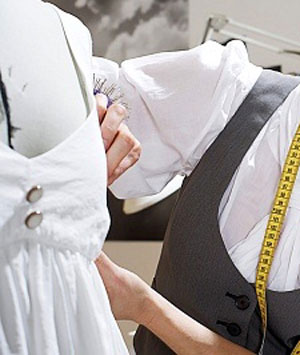Tailor/Dressmaker
Tasks & duties

Tailors and dressmakers may do some or all of the following:
-
discuss customers' requirements
-
take customers' measurements
-
estimate how much the garment will cost to make
-
source materials
-
mark and cut the material according to the design
-
tack (loosely stitch) the garment pieces together
-
sew the garment pieces together
-
put in the padding and shaping materials
-
fit the garment on the customer
-
do garment alterations
-
design or alter patterns
-
run their own business
Specialisations
Tailors and dressmakers can specialise in a range of areas including:
-
wedding and special occasion gowns
-
bespoke suits
-
corporate wear
-
work wear
Skills & knowledge

Tailors and dressmakers need to have:
-
sewing skills and knowledge of tailoring techniques
-
knowledge of different sewing equipment and methods
-
understanding of garment construction and pattern-making skills
-
knowledge of human body shapes
-
clothing design skills
-
knowledge of different fashions
-
knowledge of fabric types, colours and fabric care
-
cutting skills
-
maths skills for making calculations and measuring
-
good communication and listening skills, and the ability to interpret a client's requirements
-
organisational and problem-solving skills
Tailors and dressmakers who run their own businesses also need to have accounting and business skills.
Entry requirements
There are no specific requirements to become a tailor or a dressmaker. However, a National Certificate in Clothing Manufacture, a Diploma and/or Advanced Diploma in Fashion Design and Technology, or a Bachelor of Design (Fashion) may be useful.
Secondary education
Entry into a tertiary training programme requires at least School Certificate or NCEA equivalent passes in English and maths, and a portfolio of work. Other useful subjects include clothing and textiles, art and technical drawing.
Training on the job
You can work with an experienced tailor or dressmaker, learning on the job while earning a National Certificate in Clothing Manufacture.
Useful experience
Experience working in the clothing industry is useful, as are introductory courses in design, sewing, tailoring or pattern making.
Related courses
Fashion Design
For more information, please refer to Career Services.
Document Actions
